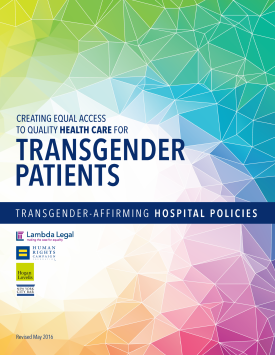Names have been changed for privacy.
For five days, Kendra Jones waited in the emergency room at a local hospital, desperately hoping a doctor would see her.
Having come to the hospital with suicidal thoughts, Jones arrived at the ER expecting prompt and competent care from compassionate and considerate hospital staff.
But as a transgender woman, Jones’s experience dramatically differed: staff told her they “didn’t know” where to put her or how to treat her problem—a concern that had nothing to do with her gender identity.
Experiences like Jones’s are not uncommon for transgender people seeking medical care. A 2010 Lambda Legal survey found that 70% of transgender or gender-nonconforming people seeking medical care faced discrimination and substandard care.
In an effort to curb this troubling problem and protect the rights of transgender and gender-nonconforming patients, Lambda Legal and a team of advocates released a new set of transgender-affirming model policies for hospitals and health care providers.
In addition to reaching hospital administrators, we want you to know your rights as you advocate for yourself in health care settings. Read the new guidelines here: Creating Equal Access to Quality Health Care for Transgender Patients: Transgender-Affirming Hospital Policies. Some highlights are:
1. Health Care Discrimination Is Against the Law.
Earlier this month, the U.S. Department of Health and Human Services made it explicitly clear that Section 1557 of the Patient Protection and Affordable Care Act prohibits discrimination based on gender identity and sex stereotyping in any hospital or health program that receives federal funds.
It is important for hospitals to make clear that gender identity and gender expression are part of nondiscrimination policies. This reinforces your right to respectful, knowledgeable treatment and care.
2. Privacy
Transgender people deserve privacy when seeking care. It is inappropriate for health care providers to invite hospital staff not involved in the patient’s care to observe the patient’s body for any reason other than legitimate training purposes.
What this means is that under no circumstances should a person not directly involved in your treatment be permitted to observe or participate in examination of the patient.
Also, information about a patient’s transgender status or transition-related services that can identify a patient or can be used with other available information to identify a patient constitutes protected health information under HIPAA, the new model policies state. This protects your right to privacy and dignity.
3. Access to Hormone Therapy
Not all transgender people require hormone therapy, but if you are admitted to a hospital and are currently taking hormones, that treatment should not stop unless there is a medical reason to do so. A transgender-affirming policy, according to the new model policies, acknowledges that abruptly stopping hormone therapy may result in negative physical and psychological consequences.
4. Protocols for Interaction With Transgender Patients
You have the right to be referred to by the name and pronoun you use, regardless of what is on your insurance or ID. Transgender patients deserve to be treated with dignity and respect. Refusing to refer to a person by the person’s pronouns and name in use, or asking inappropriate questions about genitalia or surgical status in an effort to determine the person’s “true” gender, is a form of harassment. Such behavior violates a patient’s rights to privacy and dignity.
5. Room Assignments
You have the right to a room assignment in accordance with your gender identity. In failing to grant room assignments consistent with gender identity, hospitals engage in a form of discrimination that jeopardizes transgender patients’ dignity and privacy. This may cause transgender patients to delay or avoid seeking medical services. The updated model policies highlight the significance of safe and appropriate room assignments.
For more information, and to learn more about how the model policies protect access to restrooms and personal items that assist gender presentation, see Creating Equal Access to Quality Health Care for Transgender Patients: Transgender-Affirming Hospital Policies (updated May 2016).
If you feel you have experienced discrimination in a health care setting, contact Lambda Legal’s Help Desk.





